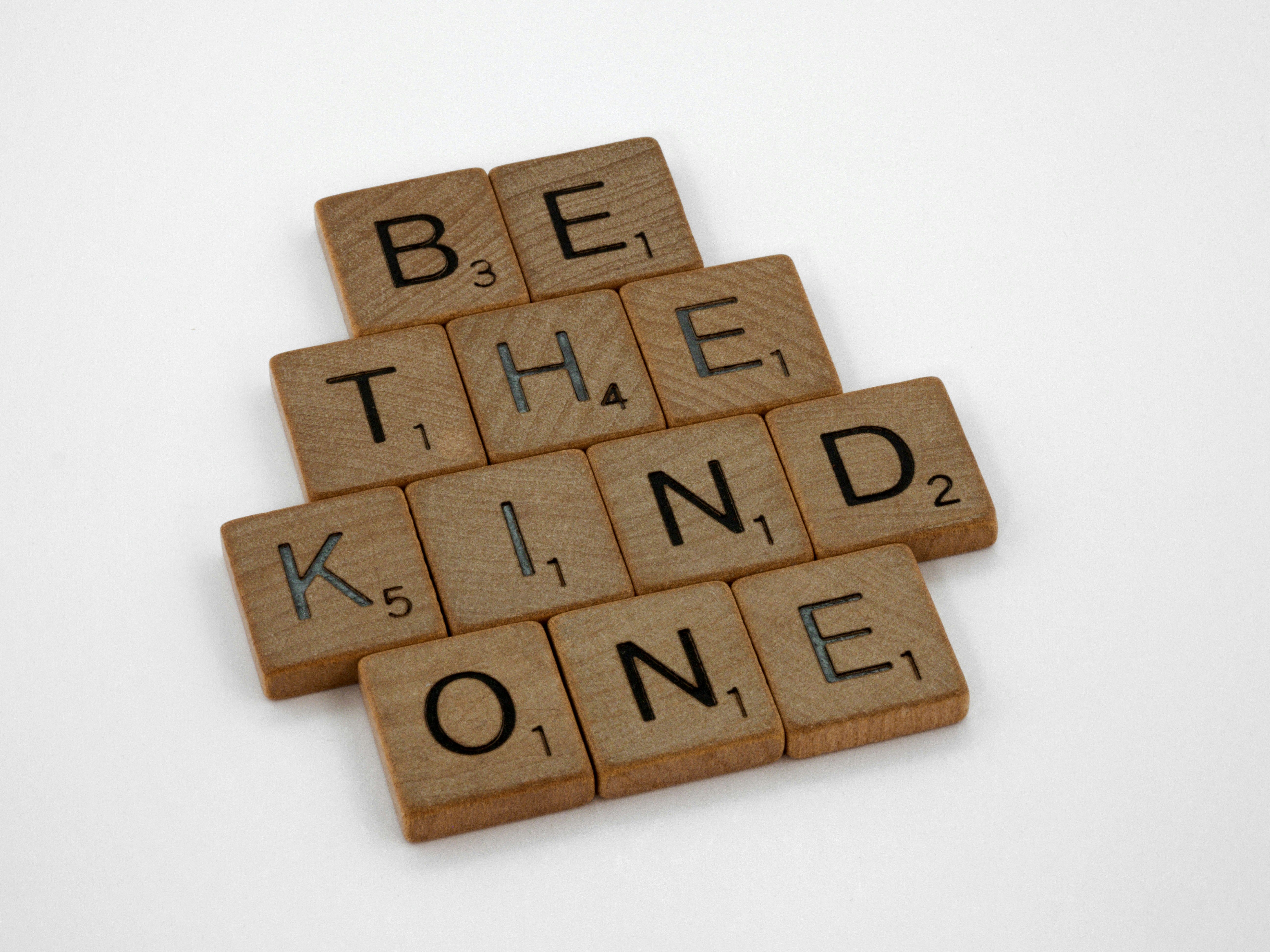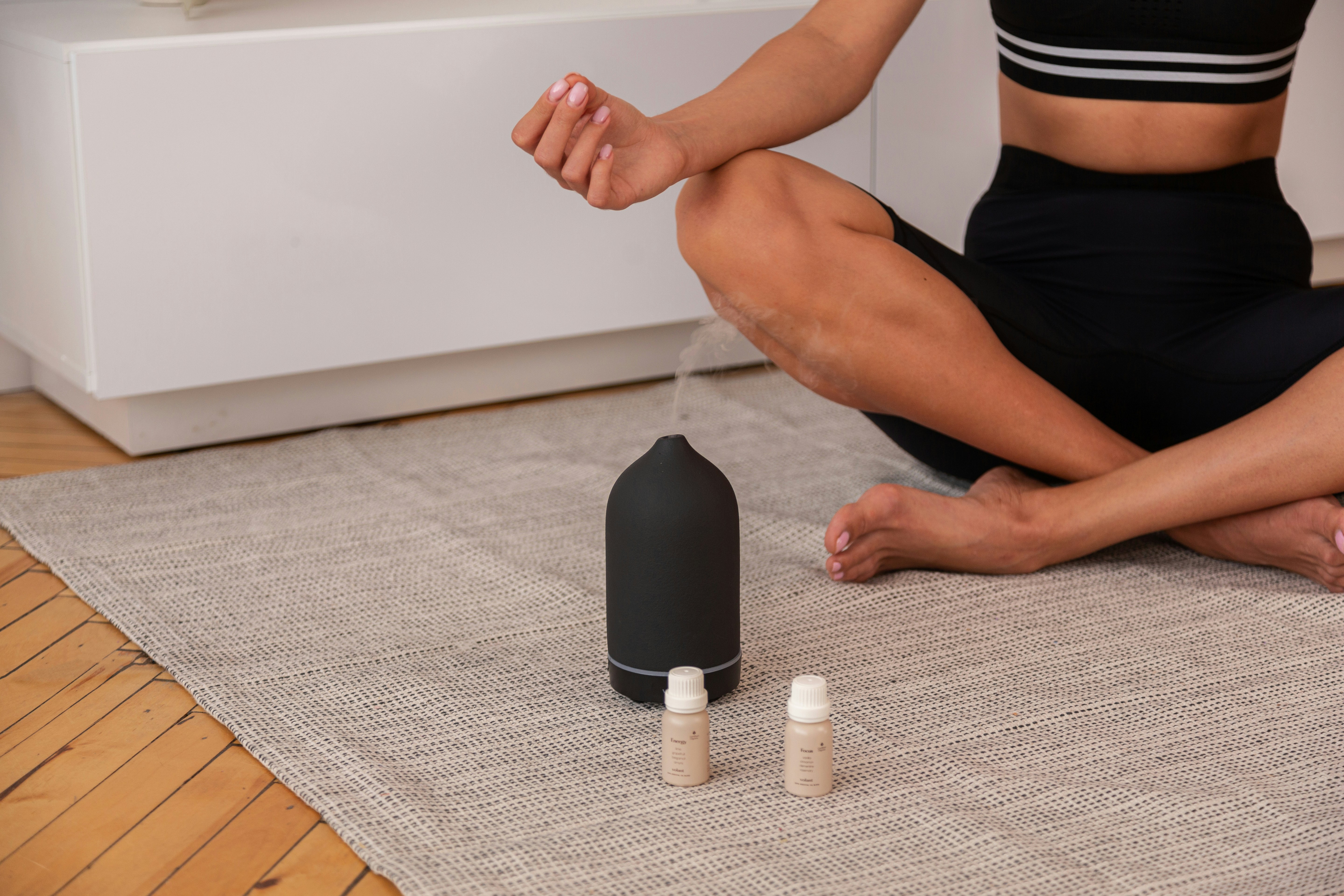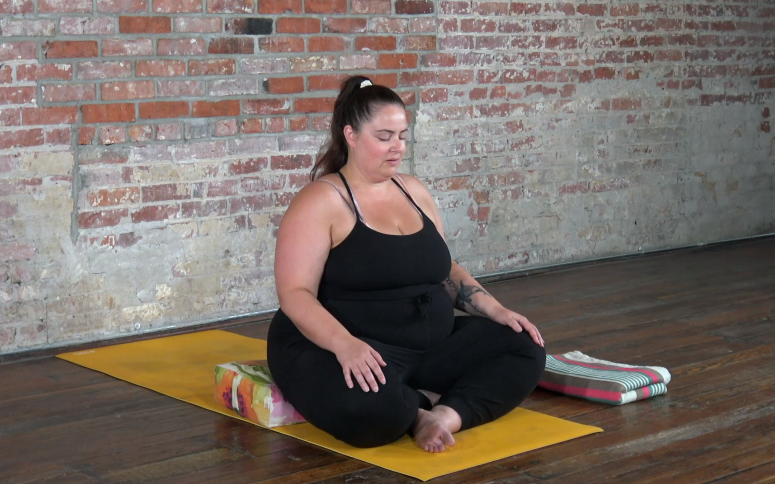Stepping onto your yoga mat can be like entering a quiet conversation with yourself, one that unfolds through every stretch and breath. Imagine for a moment that each pose is a word and each sequence a sentence in the ongoing dialogue of discovering who you truly are.
In today’s world, where the hustle is glorified and the noise around us can drown out our inner voice, yoga offers a refuge—a space to reconnect and practice the art of self-compassion.
We often enter yoga with a desire to improve—be it our flexibility, our strength, or our peace of mind. But as we dive deeper into the practice, we may start to unravel more than just physical tension. The dam of emotional resistance may begin to break, letting the river flow free, and allowing us to adopt a new, more gentle perspective toward ourselves.
In that sense, self-compassion encompasses two things: self-discovery and self-care. One leads to the other, but you need both to genuinely extend respect and compassion towards oneself.
Let’s take a look at the meaning of self-compassion before uncovering how yoga can help us nurture it.
The True Meaning of Self-Compassion
When we talk about self-compassion, what exactly do we mean?

Simply put, it’s treating yourself with the same kindness and understanding you’d offer a good friend when they’re struggling. Think of the last time you comforted your best friend when they went through something really difficult. That inexplicable desire to erase their sadness because you know they deserve the world; the urge to uplift their spirit and say the right words that would get them to see just how amazing they are.
Well, it’s like that but in this case, you need to be that friend to yourself. It’s recognizing that being imperfect, making mistakes, and encountering life’s challenges are inevitable parts of being human.
Psychologist Kristin Neff, a leading expert on self-compassion, defines it as “being warm and understanding toward ourselves when we suffer, fail, or feel inadequate, rather than ignoring our pain or flagellating ourselves with self-criticism.” This perspective shifts how we view not only our failures but also our personal worth.
The Impact of Self-Compassion
The impact of nurturing this kind, compassionate voice within us makes a world of difference. Research shows that it can dramatically improve our mental health by reducing anxiety, depression, and stress.
Beyond mental health, self-compassion influences everything from the way we handle stress at work to how we interact in our personal relationships. It teaches us to be more forgiving and less judgmental towards ourselves, which in turn makes us more empathetic and understanding towards others.
Yes, the power of self-compassion lies in its ripple effect of positivity that starts within but quickly spreads outward. Yoga is a tool that allows us to nurture and grow self-compassion.
This is why we should learn how to be the friend we need, especially when times get tough.
The Limits of Self-Compassion and Seeking Professional Help
While practicing self-compassion and incorporating mantras into your daily routine can significantly improve your mindset, it’s important to recognize that these practices alone may not be sufficient for everyone.
If you find yourself struggling with persistent negative thoughts, invasive thoughts, or symptoms of depression, it is imperative to seek professional help.
Mental health professionals, such as therapists and counselors, can provide you with the support and tools necessary to address deeper issues that mindful self-compassion and yoga can’t resolve on their own. With a mental health professional you can develop a comprehensive treatment plan tailored to your unique needs, which ultimately may involve yoga but in a more supportive role.
Remember, reaching out for professional help is a sign of strength, not weakness. It’s also the ultimate act of self-compassion towards ourselves.

Cultivating Self-Compassion Towards Our Body
Cultivating self-compassion toward our body is a long process that involves recognizing its needs, honoring its limits, and appreciating its inherent worth.
The following steps outline the beginnings of this journey, and how next time you’re on the mat, you can start changing some of the negative perspectives you may have for your body and your worth.
Step 1. Observe and Accept: Bring Your Thoughts Into Your Awareness
The first step in nurturing self-compassion is to recognize and bring the judgments and negative self-talk we often direct toward ourselves into consciousness. It’s important to identify these thoughts without fixating on them or attaching emotions to them.
Here’s a trick: As you move through your yoga poses, use the transition between each posture as a moment to breathe deeply and let these thoughts pass through your mind like clouds in the sky—observe them, but don’t dwell on them.
If you do feel emotions rise, that’s also okay and part of the process. Pay attention to your body’s signals without judgment. Whether it’s tension, fatigue, or a rush of energy, acknowledge what you feel without criticism. A simple way to practice this is through a body scan meditation where you focus on each part of the body in turn, noticing any sensations or emotions that arise.

Step 2. Take Action: Change Negative Thoughts Into Positive Talk
Once you’ve become aware of your negative thoughts, the next step is to transform them into positive affirmations.
Our inner critic can often be harsh, especially regarding our body’s appearance or capabilities. This is where the action of mindfulness exercises or meditations comes into play.
For example, if you catch yourself thinking, “I am not good enough,” pause and reframe that thought to, “I am doing my best and that is enough,” “I am doing my best” or “My body deserves respect for all it does for me.”
The transformation of these thoughts into positive affirmations (even better if you do it out loud), is incredibly powerful. It helps the brain to rewire the habitual patterns of self-talk towards more positive and supportive messages. We’re literally teaching and conditioning our brain to be a good friend to us.
Gradually, you’ll be able to completely change the tone of your inner dialogue.

Step 3: Build New Perspectives: Introduce Self-Compassion Mantras
To firmly root self-compassion in your daily life, try integrating compassionate mantras into your routine. These are positive, affirming statements that you can repeat to yourself during yoga, meditation, or throughout the day.
Mantras to help you be more self-compassionate:
- This is hard for me, but I’m not alone. I’m here for myself. I’m strong and capable, and I will get through it.
- There’s nothing wrong with me for feeling this way. I should not be ashamed. I’m not the only one feeling this way. It’s only human.
- It’s okay to ask for what I need. It’s okay not to be okay. I will let my body feel what it feels, honor my needs, and ask for what I need to kindle my own light.
- I am enough, here—right now, as I am.
- I love and accept myself. I forgive myself for not understanding. I am strong, I am healing.
- I am worthy of love, I am love. I love myself unconditionally and without judgment.
Memorize and repeat these mantras whenever you identify that negative thoughts begin to creep in. This will help to solidify them as part of your subconscious, making self-compassion a natural part of your mindset. Over time, these mantras become second nature and reshape your perspective towards continuous self-support and acceptance.
However, it’s important to be realistic about situations and acknowledge that it’s okay to struggle with this practice. False positivity can be counterproductive, so be gentle with yourself and understand that changing self-talk is a gradual and not an all-mighty process. Embrace your journey with compassion, knowing that it’s perfectly normal to have setbacks along the way. You may even find that using specific mantras is not working for you – which is also OK! Take the time to figure out the best ways to approach yourself that feel in line with your needs and personality. For some people, internal dialogues and figuring out where negative thoughts are coming from works better than this sort of repetition.

4. Be Grateful: Care For Your Body and Mind Through Healthy Practices
Lastly, show gratitude to your body by engaging in activities that nourish and refresh it. This could be gentle yoga, a relaxing bath, or simply getting enough sleep and eating healthy. By treating your body with care, you reinforce its value and your appreciation for it.
In love, people often say that actions speak louder than words. So, don’t just say that you love yourself, prove it by taking care of your mind and body.
In addition to this, regularly expressing gratitude for your body’s abilities and what it allows you to experience each day can deepen your relationship with it.
Here’s a trick: Finish each session with a minute or two to yourself, to say thank you to yourself for showing up on the mat and taking care of your body and mind. Also, promise yourself that you will come back again.
Yoga Classes That Promote Self-Compassion
While the steps above can help you cultivate self-compassion regardless of what type of yoga you practice, you can also try classes that are specialized for practicing self-compassion.
Below are some yoga classes that focus specifically on nurturing self-compassion and inner acceptance. Each session is tailored to help you deepen your relationship with yourself through mindful movements and meditative practices.
Yoga for Inner Acceptance by David Procyshyn
This class helps you connect with yourself on a deeper level, encouraging acceptance of your body and emotions as they are. The gentle flow sequences are designed to ease physical tension and align your thoughts with a more compassionate view of yourself.
Yoga for Self-Compassion by Ron Stewart
Ron introduces poses and breathwork that open the heart and soothe the mind. It’s perfect for those days when you feel critical of yourself and need a reminder of your intrinsic worth.
Fly With Faith by Basha Nemeskeri
“Fly With Faith” is an inspiring class that combines yoga poses with affirmations to boost your confidence and self-belief. As you move through the sequences, you’ll be encouraged to let go of doubt and trust in your own strength and potential. However, keep in mind that the class is a bit more advanced. If you’re just starting out, our first two recommendations would be a better fit.

Guided Meditation for Compassion by Helen Camisa
This guided meditation leads you through a series of visualizations and mantras that foster compassion towards yourself and others. You’re in for a soothing experience that melts away harsh self-judgment and replaces it with a loving and nurturing attitude.
Loving Kindness (Metta) Meditations by Peter Renner
Explore the traditional practice of Metta, or loving-kindness meditation, with Peter’s gentle and soothing voice. The session involves directing good wishes towards oneself and others. These meditations are powerful tools for opening the heart and cultivating an atmosphere of kindness in every aspect of your life.

Continuing Self-Compassion Off the Mat
So, why should we nurture self-compassion? Because it’s the foundation of a healthier, more balanced life. Yoga can help us learn to hold ourselves with the same patience and kindness we so readily extend to others, recognizing that we, too, are worthy of care and compassion.
But, practicing self-compassion one hour a day, or even less, is not enough. We deserve more! So, let yoga be a kick-off to long-term habits that extend to all aspects of our daily life.
The lessons we learn in yoga—patience, acceptance, and kindness—can change the way we interact with ourselves and the people around us in everyday life. Each moment presents an opportunity to practice self-compassion, whether it’s responding to a stressful email, navigating a difficult conversation, or simply dealing with the ebbs and flows of everyday life.
When things get tough, take a deep breath and let it be a reminder of what you learned on the mat. Then, create small rituals that reinforce this mindset, and before you know it, you’ll have modified the way you think and speak to yourself, one millimeter at a time.











